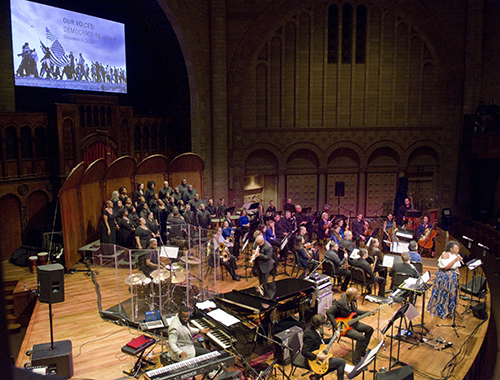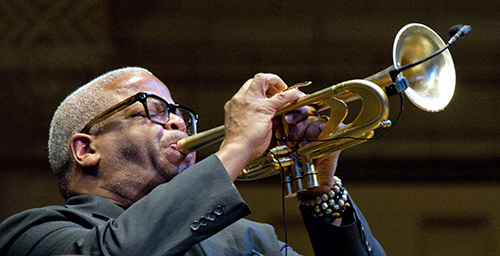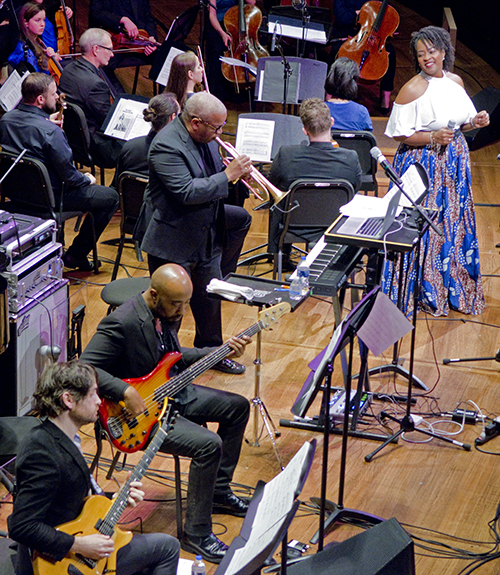by Mike Telin

Perhaps this is too somber of an opening because there was plenty of outstanding and uplifting music-making going on, beginning with the excellent singing by the Spirit of the Grove Gospel Choir during Vincent Bohanan’s We Win. Under the direction of Jimmie Parker, the Choir was vocally polished and full of energy.
Tri-C JazzFest is all about creating opportunities for the next generation of musicians to study America’s Classical Music. But what trumpeter Dominick Farinacci and his Spirit of the Grove Collective produced onstage was remarkable. Joining the Choir and poet Orlando Watson for Donald Byrd’s captivating jazz hymn, Cristo Redentor, these high school students sounded like seasoned players.
During Freedom is not Free, with lyrics by Patrick Warner and music by Farinacci, the ensemble — Thomas Schinabeck on alto saxophone, Jonah Benchek on piano, and Gabriel Jones, Cameron Burton, and Samantha Rosselot on drums and percussion — was seamless as they passed around inventive solos. They also provided the talented Warner, who is a student at Tri-C, with a colorful palette as he delivered lines like “Freedom is not free unless you’re willing to pay the price.”
Grammy-winning trumpeter and composer Terence Blanchard has often used his art to confront “painful American tragedies both past and present.” During selections from his film score for Spike Lee’s BlacKkKlansman, Blanchard joined his E-Collective — Charles Altura, guitar, Dale Black, bass, James Francis, piano, and Oscar Seaton, drums — as well as CityMusic Cleveland Chamber Orchestra under the direction of Matthew Jaroszewicz. The section titled “Blood and Soil” included footage of President Barack Obama giving a fiery speech at the Selma Bridge, of the horrific events in Charlottesville, and of marches by Black Lives Matter. Blanchard’s music provided subtle support, allowing listeners the space to focus on the screen’s sometimes gruesome, but all-too-real message.
Commissioned by Tri-C JazzFest and Cuyahoga Community College, Blanchard’s OUR VOICES: DEMOCRACY RE:visited is inspired by the Voting Rights Act of 1965, and “reflects the conditions, events and individuals that have produced political change and impacted public policy.” This world-premiere performance featured Blanchard, his E-Collective, CityMusic, the Gospel Choir, and poets Orlando Watson and RA Washington.

Two pieces featuring the extraordinary vocalist Quiana Lynell brought the evening to a close. Backed up by the E-Collective and the Spirit of the Grove Gospel Choir, Lynell, winner of the 2017 Sarah Vaughan International Jazz Vocal Competition, gave a dramatic performance of Joshua Campbell’s spirited call to action, Sing Out, March On.

Early on in the evening, the audience was reminded that jazz has always been a voice of democracy. Blanchard left us with one final reminder — the best way to have our voices heard is to get out and vote.
Published on ClevelandClassical.com November 27, 2018.
Click here for a printable copy of this article


